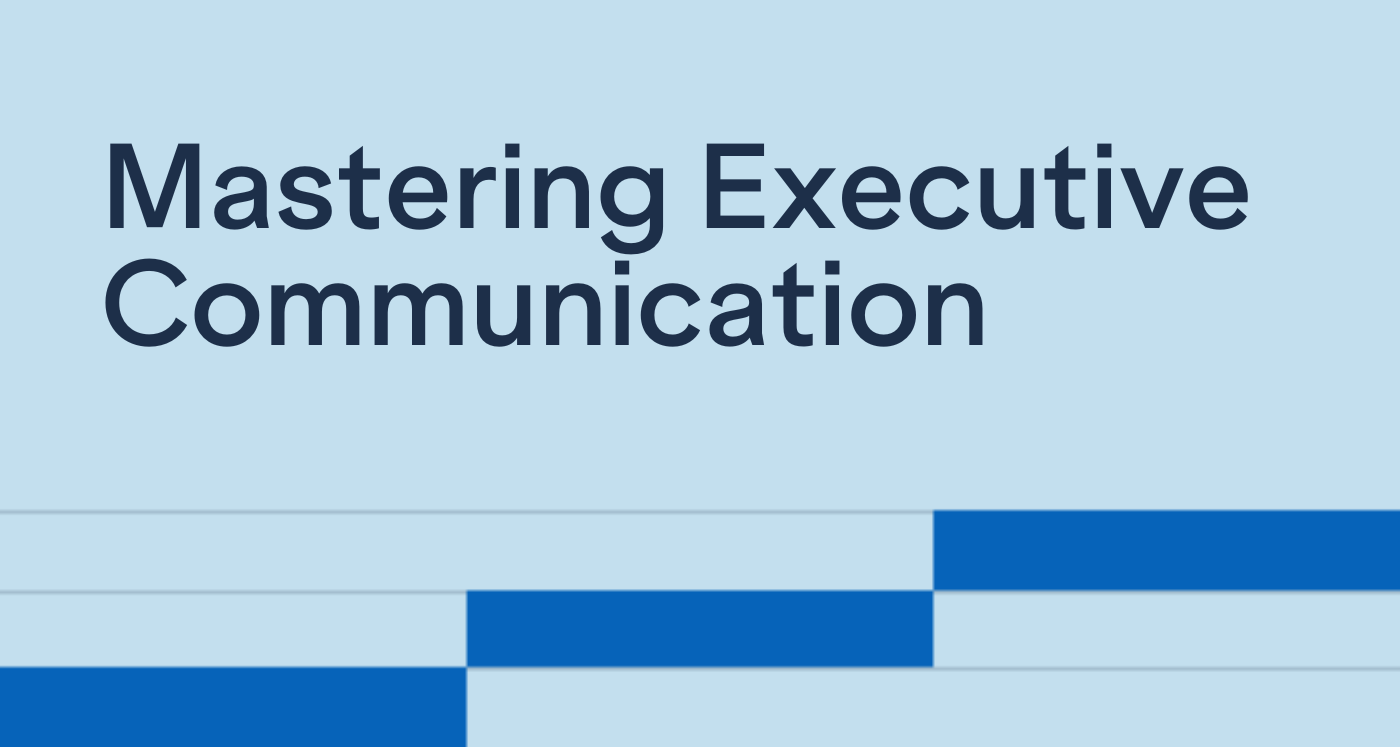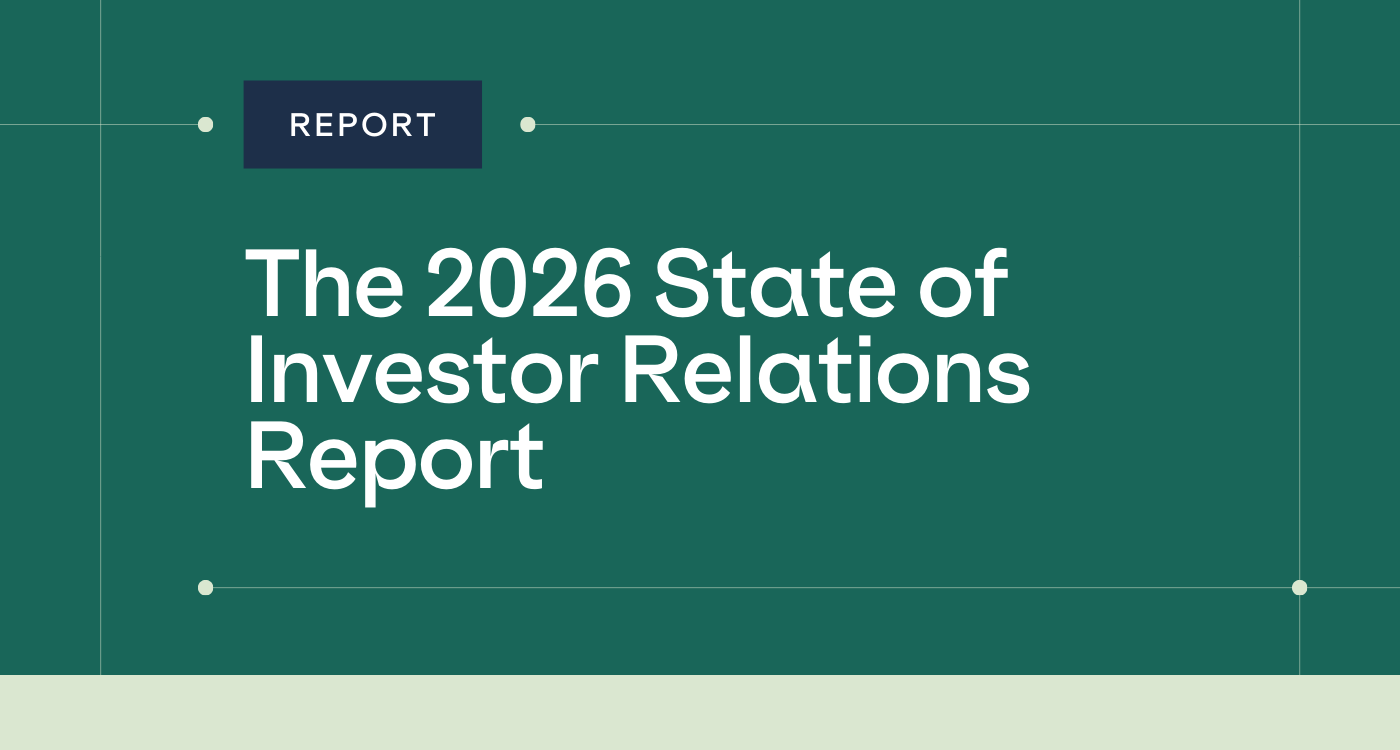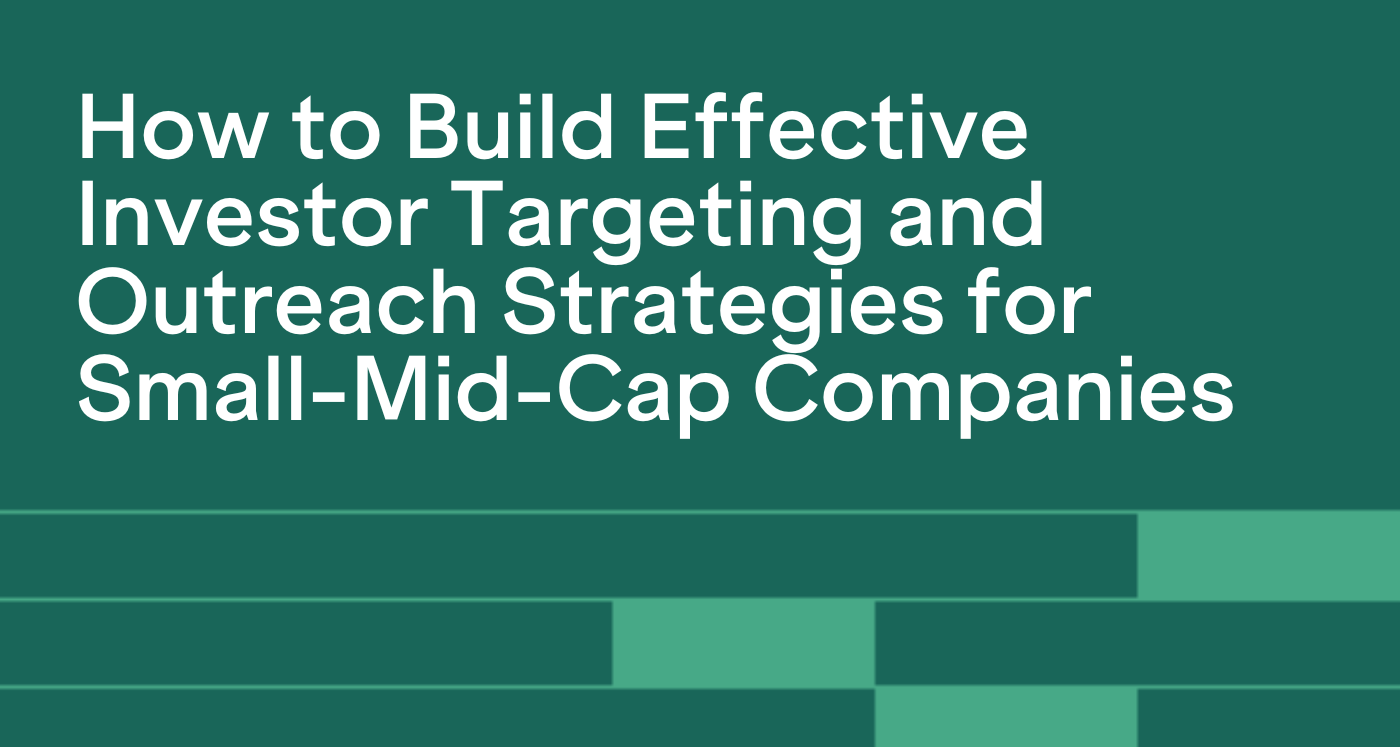
Mastering Executive Communication: Insights from David Calusdian on Effective Investor Relations
Effective investor relations extends far beyond crafting compelling messages. Learn how the experts deliver their story strategically.

Brian:
Hi, everyone, Brian Valerio, VP in the proxy solicitation group at Alliance Advisors, and I'm back with another one of our series where we interview a industry leader about their service offerings so that we can educate our viewers about some of the available opportunities out there. And they can learn a little bit more about some of the auxiliary services that are out there in the industry today.
So today, I have David Whyte, who is co founder and CEO of Irwin. Irwin is a leading technology provider for capital markets, professionals, so they do a lot of work in the IR space. So I thought it'd be a great opportunity to bring him in, talk about Irwin, talk about what they do, so that we could learn a little bit more about the IR space. So with that as the setup, David, thank you so much for joining us. We really appreciate all the work that Irwin does, we've got a lot of clients together, we've got a lot of mutual clients, they rave about the service that you guys, do, they think you guys do a tremendous work for them. So can you tell us about Irwin, tell us about the company?
Dave:
Yeah, of course. And thanks for having me, Brian, it's great to be here. So we started the company four years ago by myself and Mark Fasken. The genesis of the business really came from my experience working in capital markets. I started my career in investment banking, and then moved over to the the equity trading side of business. It's really there that I saw that there's a significant regulatory shift, they are really making it harder for issuers and investors to interact the way they have historically. And so Irwin is an investor relations software product for global public companies and their advisors and is designed to help realized shareholder value by intelligently targeting, monitoring, accessing and interacting with global investors. And so we've built Irwin to solve the evolving and growing challenges that public companies and their advisors are facing today.
Brian:
So as the pandemic persists, and continues into 2021, as it appears it will, we are getting some great news seems like week over week about vaccines. And it seems like we are definitely trending in the right direction, the infection rates are decreasing, but there is still the ongoing pandemic and it is looming over the way that people are continuing to conduct business in 2021. So how have you seen Investor Relations teams adapting to this change? And how should they be adapting to the current climate that we are in?
Dave:
Yeah, good question. So there's a statistic that 70% of portfolio managers, won't invest in a company until they meet with the management team of that company, and COVID certainly hasn't changed that. So if anything, it's made meeting with management teams more accessible. So instead of having to jump on a plane, fly around the world, meet with that company, kick the tires, you can just now hop on a call, just like we're doing today. So there's been you know, there's also been a continued shift in companies going direct to investors and vice versa without the use of the intermediary. And in order to do this companies require the appropriate data and workflows, so that time and resources aren't wasted by, you know, maybe taking a meeting with an investor that really isn't the right fit for your company. And as a result of that, there's been a dramatic shift in the digitization of investor relations in capital markets. And so companies had to adopt technologies such as Irwin, to adapt to this new reality.
Brian:
So you talk about a shift over the past couple years? How is IR as an industry in a practice evolved or changed over the past few years?
Dave:
Yeah, good question. So if you rewind back, even four or five years ago, IR was very much more of a communications and administrative based role. And it's really transitioned into more of a sales or strategy or analytic space role. And so as a result, we've seen a shift in the type of person that's moving into IR professional. So now you're seeing former sell-side professionals, former buy-side professionals move into that seat, because IR has really become much more mission critical position to the success of a public company.
Brian:
And so what are those challenges? What are some of the key challenges that IR professionals are facing and the IR teams are facing at these public companies?
Dave:
Yeah, so for newer public companies, there's always a steep learning curve and learning how capital markets function. There's a lot of moving parts and we help our clients a lot with that. We like to take a hands on approach with our clients and educate them on these sort of things. And generally speaking, there's a broad challenge for hire teams and understanding how to optimize their cost of capital and to paint a path to get there. Another challenge that we often encounter is managing the process of a growing shareholder base as the company evolves into different stages of maturity. So managing shareholders as a micro path looks different than managing shareholders are those, you know, small, medium, and large cap. On top of all this, there's obviously ever changing and evolving regulatory landscape. MIFID2 has been very tough for the last few years. ESG is in that position now. And so IRO is where a lot of half their streaming business professionals, and we find that it's a constant struggle to remain organized and to develop business continuity across both the IR department and C suite. And so that's why a product like Irwin, which has a CRM and large database, to maintain record of all your contacts organization's activities is so important. We work alongside our clients, both in the service and abroad perspective to help them stay organized.
Brian:
So let's talk about what makes an effective Investor Relations program and practice. You talked about the different types of people that are involved in it and the different responsibilities and the hats that they have to wear. And there's different, you know, prerogatives if you will, and priorities for different sized companies. But are there some themes overall that universally apply to running a successful investor relations team?
Dave:
Yeah, absolutely. I mean, IR professionals, as I mentioned before, they're they're now being tasked with taking on much more proactive and sales based approach with a focus on relationship management, relationship building. And in order to manage these relations, well, you need the right tools in place, and the ability to represent your company, not just from a capital markets perspective, but from an operating perspective, as well, you need to know the ins and outs of your company to be able to relate as investors and so someone who possesses both a strategic mindset and i's a strong communicator will excel in an IR role.
Brian:
So IR professionals have tons of different responsibilities, but probably chief among those is making sure that they have access to the appropriate pools of capital, and they have information on the most up to date investors that could potentially buy in or buy more shares in the company. So how can Irwin and how can IR professionals help? And how can IR professionals get that type of information?
Dave:
Yeah, yeah, good question. So everyone knows, you know, to go to the major money centers, such as Boston, New York and London, the main players within those centers are generally very well known. And as a result, those opportunities tend to be saturated. And we frequently hear from companies who suggested they have the best list of investors for them. The fact is, is that there's significant turnover in the investment industry. So even if that is the case, it won't be for long. We at Irwin we are a data company, data driven company first. So we tell our clients to let us focus on on that side of the business for them, so they can focus on managing nurturing those relationships. It's especially important now as we experienced the continued shift to a digitized economy, Irwin, as a solution will actively identify and suggest tertiary investors that are more opaque in nature. So these investments could be non reporting asset managers, family offices, investment advisors with the discretion of capital, these are very high value investment groups that will support your stock, partner with you and not necessarily just sell out if you have a bad quarter. Ultimately, these groups will lower your cost of capital and help you grow as a company. So Irwin has many features to help our clients do exactly that.
Brian:
So the phrase that really resonated with me is data driven. That is what we pride ourselves on at Alliance advisors. So I think that's probably why we work so well together. And one thing that I also heard in there is that you have to really understand who your shareholders are. And it's not always so easy, because it's not always just the shareholders that are located in the big money market capitals that you identified earlier. Sometimes it's some of these smaller or more opaque or obscure shareholders. So what can companies do to better understand who their shareholders are specifically that more difficult to identify shareholder base?
Dave:
So first and foremost, we would always advocate for relationship management, the more people that you're talking to, the more you'll develop a better sort of mosaic understanding of who your shareholders are. We always advocate for doing this in conjunction with a platform like Irwin. Irwin as a platform from a shareholder margin perspective now represents now has the most accurate and comprehensive shareholder monitoring information available on the market. Part of that is through our partnership through through with the you Alliance advisors on the surveillance side, the second part of that is on the NOBO list side. So happy to talk with that more.
Brian:
Yeah, talk a little bit about the NOBO list and how you guys Use it and how that is I believe that's something that's unique to your guys product and how you guys service your clients. So talk about that a little bit.
Dave:
Yeah. So obviously, you know, there's been a lot of changes in market conditions this year. One example that is sort of the comeback of the retail investor. And so over the last couple years, we've developed an integration with Broadridge Financial Solutions, where we integrate our clients NOBO list at various frequencies into the platform, we plan to parse the data, so that our clients can see the report shareholders that surveilled your shareholders if they're working with you, and NOBO shareholders all in one, which as it says, represents the most accurate and comprehensive view available on the market today.
Brian:
Right, because then you'll pick up some of those larger holders who aren't necessarily required to file 13Fs
Dave:
And that gives you retail investors, while not all them are going to be NOBO you know, a good portion of them will be and so that's really the only view that you're going to get into your shareholder into your retail shareholder base.
And we've obviously seen the explosion of retail trading over the past year or so it's really taken off, there's been a large increase in day trading due to people having a lot more time at home during the pandemic, a lot of people have their working conditions have changed. And they've taken that opportunity to involve themselves in some day trading, which has led to so many more retail holders being in stocks and being influential in stocks. So how is this something that IR teams need to be thinking about? And like, what types of concerns should IR teams have when it comes to retail holders?
Yeah, so I mean, firstly, it's really important to not underestimate retail investors, they actually represent the largest pool of capital in the world. So it goes without saying that they're very important for your company. No matter how big or small your company is, it's also increasingly important to ensure that your shareholder communications are in place in a way that can best educate and describe your story to these retail investors, they tend to have a shorter attention span. So ensure that how you're telling your company's story- stay concise stay factor, then that will always result in the best outcomes. Try not to get bogged down in minutiae of your business. And so we routinely hear of companies that are both neglecting and not prioritizing their retail shareholders, which we think is a large missed opportunity that we would always advocate for spending time with all your shareholder groups. Obviously, it depends on the stage and maturity of your business, but definitely not something to overlook.
Brian:
Well, thank you so much for your time today, David, look forward to continue to working with you and the rest of the Irwin team going forward, I will definitely share some of the insights from today with some of my clients to give them some of the best practices in Investor Relations. One key takeaway that I will certainly be sharing is to tell your story and take control of the narrative. Otherwise, somebody else will do it for you, and the messaging might not get delivered in the way that you want it to. So I will definitely be sharing that and some of the other insights you provided today with my clients. Thank you so much to the audience out there. Please feel free to connect with me or David directly if you would like to learn more about Irwin and their services.
Dave:
Thanks a lot, Brian.
Brian:
Great having you, talk soon. Thanks.
Discover how High Tourch IR is leveraging their inverstor relations through Irwin

Effective investor relations extends far beyond crafting compelling messages. Learn how the experts deliver their story strategically.

Across geographies and market caps, one theme is consistent: IR is entering a period of recalibration. Learn what's changing in 2026.

Learn how seasoned IR veterans are executing targeting strategies for small-mid-cap companies.